- Home
- William Maxwell
The Chateau Page 8
The Chateau Read online
Page 8
“How amusing,” Mme Viénot said. “He sells them on the street corner?”
“To tobacco stores, I believe.”
“And is he successful?”
“Very. He’s on his way to becoming a millionaire.”
Mme Viénot nodded approvingly. “When he arrived, he didn’t know a word of French, and it was rather difficult at first. But he spoke fluently by the end of the summer. We also discovered that he was fond of chocolate. He used to ride into the village after dinner and spend untold sums on candy and sweetmeats. And he was rather careless with my bicyclette. I had to have it repaired after he left. But he is a dear, of course. That reminds me—I haven’t answered his mother’s letter. I must write her today, and thank her for sending me two such charming clients. It was most kind of her. I gather that she knows France well?”
Harold nodded.
“Such an amusing thing happened—I must tell you. My younger daughter became engaged last summer, and before she had quite made up her mind, George came to me and said that Sabine must wait until he could marry her. Fancy his thinking she would have him? I thought it was very fresh—a fifteen-year-old boy!”
“He speaks of you all—and of the place—with great affection,” Harold said.
“It was a responsibility,” Mme Viénot said. There are so many kinds of trouble a boy of that age can get into. You’re quite sure you won’t have anything more? Some bread, perhaps? Some more coffee?” She rolled her napkin and thrust it through the silver ring in front of her, and pushed her chair back from the table. “When George left, he kissed me and said: ‘You have been like a mother to me!’ I thought it sweet of him—to say that. And I really did feel like his mother.”
As they were moving toward the door, he said hurriedly: “We’ve been meaning to ask you— Is there some way we could have hot water?”
“In your room? But of course! Thérèse will bring it to you. When would you like it? In the evening, perhaps?”
“At seven o’clock,” Barbara said.
“I could come and get it myself,” he said. “Or would that upset them?”
“Oh, dear no!” Mme Viénot exclaimed. “I’m afraid that wouldn’t do. They’d never understand in the kitchen. You must tell Maman about the poupées. She will be enchanted.”
“PORC-ÉPIC is French for porcupine,” he announced. He was stretched out on the chaise longue, in the darkest corner of their room, reading the green Michelin guide to the château country. “The porcupine with a crown above it is the attribute—emblem, I guess it means—of Louis XII. The emblem of François premier is the salamander. The swan with an arrow sticking through its breast is the emblem of Louise of Savoy, mother of François premier. And it’s also the emblem of Claude de France, his wife. Did you know we have a coat of arms in our family?”
“No,” Barbara said. “You never told me.” She had covered the towel racks in the bathroom with damp stockings and lingerie, and was now sitting at the kidney-shaped desk, with her fur coat over her shoulders and the windows wide open because it was no colder outside than it was in, writing notes to people who had sent presents to the boat. There were letters and postcards he should have been writing but fortunately there was only one pen.
“The ermine is Anne of Brittany and Claude de France,” he said, turning back to the guidebook.
“Why does she have two emblems?”
“Who?”
“Claude de France. You said—”
“So she does … Ummm. It doesn’t say. But it gives the genealogy of the Valois kings, the Valois-Orléans, the Valois-Angoulême, and the Bourbons through Louis XIV.… Charles V, 1364–1380, married Jeanne de Bourbon. Charles VI, 1380–1422, married Isabeau de Bavière. Charles VII—”
“Couldn’t you just read it to yourself and tell me about it afterward?”
“All right,” he said. “But it’s very interesting. Charles VIII and Louis XII both married Anne of Brittany.”
“The salamander?”
“No, the ermine. I promise not to bother you any more.” But he did, almost immediately. “Listen to this, I just want to read you the beginning paragraph. It’s practically a prose poem.”
“Is it long?”
“ ‘Between Gien and Angers, the banks of the Loire and the affluent valleys of the great river present an incomparable ensemble of magnificent monuments.’ That’s very good, don’t you think? Don’t you think it has sweep to it? ‘The châteaux, by their number, their importance, and their interest appear in the foreground. Crammed with art and history, they occupy the choicest sites in a region that has a privileged light—’ ”
“It looks like just any gray day to me,” she said, glancing out at the sky.
“Maybe the light is privileged and maybe it isn’t. The point is you’d never find an expression like that in an American guidebook.… ‘The landscapes of the Loire, in lines simple and calm’—that’s very French—’ owe their seductiveness to the light that bathes them, wide sky of a light blue, long perspectives of a current that is sometimes sluggish, tranquil streams with delicate reflections, sunny hillsides with promising vineyards, fresh valleys, laughing flower-filled villages, peaceful visions. A landscape that is measured, that charms by its sweetness and its distinction—’ ”
He yawned. The guidebook slipped through his fingers and joined the pocket dictionary on the rug. After a minute or two, he got up and stood at the window. The heavy shutters opened in, and the black-out paper was crinkled and torn and beginning to come loose. Three years after the liberation of France, it was still there. No one in a burst of happiness and confidence in the future had ripped it off. Germans, he thought, standing where he stood now, with their elbows on the sill. Looking off toward the river that was there but could not be seen. Lathering their cheeks in front of the shaving stand … Did Mme Bonenfant and Mme Viénot eat with their unwelcome guests, or in the kitchen, or where?
It had stopped raining but the air was saturated with moisture and the trees dripped. In the park in front of the château, the gardener and his wife and boy were pulling the haystacks apart with their forks and spreading the hay around them on the wet ground. He was tempted to go down and offer his services. But if they wouldn’t understand in the kitchen, no doubt they wouldn’t understand outdoors either.
“What time is it?” Barbara asked.
“Quarter of eleven. How time flies, doesn’t it. Are you warm enough?”
“Mmmm.”
“It’s like living at the bottom of the sea.”
He left the window and stood behind her, reading as she wrote. She had started a letter to her mother and father. The quick familiar handwriting moved across the page, listing the places they had been to, describing the château and the countryside and the terribly interesting French family they were now staying with. The letter seemed to him slightly stepped up, the pleasures exaggerated, as if she were trying to conceal from them (or possibly from herself) the fact that they were not as happy in their present surroundings as they had been in the Hôtel Ouest et Montgomery in Pontorson.
He moved on to the big round table in the center of the room. Among the litter of postcards, postage stamps, and souvenirs, a book caught his eye. Mme Viénot had come upon him in the drawing room after breakfast, and had made a face at the book he was looking at—corrections, additions, and objections to the recently issued grammar of the French Academy—and had said, with a smile: “I don’t really think you are ready for that kind of hair-splitting.” Taking the book out of his hands, she had given him this one instead. It was a history of the château of Blois. He opened it in the middle, read a paragraph, and then retired to the chaise longue.
Barbara finished her letter, folded it, and brought it to him to read. “Is it all right?”
“Mmmm,” he said.
“Should I do it over?”
“No,” he said. “It’s a very nice letter. Why should you do it over? It will make them very happy.”
“You don’t l
ike it.”
“Yes, I do. It’s a fine letter.” The insincerity in his voice was so marked that he even heard it himself.
“There isn’t a thing wrong with that letter,” he said, earnestly this time. “There’s no point in writing it over.” But she had already torn it in half, and she went on tearing it in smaller pieces, which she dropped in the wastebasket.
“I didn’t mean for you to do that!” he exclaimed. “Really, I didn’t!” And a voice in his head that sounded suspiciously like the voice of Truth asked if that wasn’t exactly what he had wanted her to do.… But why, he wondered. What difference did it make to him what she wrote to her father and mother?… No difference. It was just that they were shut up together in a cold house, and it was raining.
She sat down at the desk and took a blank sheet of paper and began over again. Ashamed of his petty interfering, he watched her a moment and then retrieved the pocket dictionary from the rug and placed it on the chaise longue beside his knees. While he was trying to untangle the personal and political differences of Henri III and the Duc de Guise, he raised his eyes from the print and observed Barbara’s face, bent over her letter. Her face, on every troubled occasion, was his compass, his Pole Star, the white pebbles shining in the moonlight by which Hop-O’-My-Thumb found his way home. When she was happy she was beautiful, but the beauty came and went; it was at the mercy of her feelings. When she was unhappy she could be so plain it was frightening.
After a short while—hardly five minutes—she pushed the letter aside and said, quite cheerfully: “It’s stopped raining. Should we go for a walk?”
They went downstairs and through the drawing room and outdoors without seeing anyone. Something kept them from quite liking the front of the house, which was asymmetrical and bare to the point of harshness. They looked into the courtyard at the carriage house, the stables, the high brick wall, and windows they had now looked out of. They followed the cinder drive around the other end of the house. Climbing roses and English ivy struggled for possession of the back wing, which had a much less steeply sloping roof and low dormers instead of bull’s-eyes.
The drive took them on up a slope, between two rain-stained statues, and past a pond that had been drained, and finally to another iron gate. Peering through the bars, they saw that there was no trace of a road on the other side. Nothing but the forest. They tried the gate; it was locked. They turned and looked back, and had an uncomfortable feeling that eyes were watching them from the house.
On the way down again, they stopped and looked at the statues. They looked again at the clock that straddled the roof tree of the back wing. It had stopped at quarter of twelve. But quarter of twelve how long ago? And why was there no water in the pond? Seen from the rear, the whole place cried out that there had once been money and the money was gone, frittered away.
They noticed a gap in the hedge, and, walking through it, found themselves in a huge garden where fruit trees, rose trees, flowers, and vegetables were mingled in a way that surprised and delighted them. So did the scarecrow, which was dressed in striped morning trousers and a blue cotton smock. Under the straw hat the stuffed head had sly features painted on it. They saw old Mme Bonenfant at the far end of the garden, and walked slowly toward her. By the time they arrived at the sweet-pea trench her basket was full. She laid her garden shears across the long green stems and took the Americans on a tour of the garden, pointing out the espaliered fruit trees and telling them the French names of flowers. She did not understand their schoolroom French. They felt shy with her. But the tour did not last very long, and they understood that she was being kind, that she wanted them to feel at home. Leading them to some big fat bushes that were swathed in burlap against the birds, she told them to help themselves to the currants and gooseberries, and then she went on down the garden path to the house.
A few minutes later they left the garden themselves and followed the cinder drive down to the public road, where they turned left, in the opposite direction from the village. The road led them past fields on one side and the forest on the other. They came to a farmhouse and an excitable dog, detecting an odor that was not French, barked furiously at them; then to an opening in the forest, where a wagon track wound in through tall oak trees and out of sight. They left the road and followed the wagon track. The tree trunks were green with moss and there was no underbrush, which made the forest look unreal. The ground under their feet was covered with delicate ferns. Barbara kept stooping to gather acorns. These had a high polish and a beautiful shape and were smaller than the acorns she was accustomed to. Her pockets were soon full of them.
“We don’t have to stay,” she said, turning and looking at him.
“No,” he agreed doubtfully. He was relieved, now she had given voice to his own uneasiness. But at the same time, how could they leave? “Of course we don’t,” he said. “Not if we don’t want to.”
“But we said we’d stay two weeks. What if she’s counting on that, and has turned other people away?”
“I know.”
“So in a way, we’re bound to do what we said we’d do.”
“We could tell her, I guess,” he said. “The trouble is, we’ll never have anywhere else as good a chance to learn to speak French.”
“That’s true.”
“And later we may be glad we stuck it out. We may find when we get to Paris that it is possible to talk to people in a way that we haven’t been able to, so far.”
“So let’s stay,” she said.
“We’ll try it for a few days, and then if it doesn’t work, we can leave.”
There seemed to be no end to the forest. After a short while they turned back, not because they were afraid of getting lost—there was only one road—but the way swimmers confronted with the immensity of the ocean swim out a little way and then, though they could easily swim farther, give way to a nameless fear and turn and head for the shore.
As they came back up the cinder drive, they saw the Canadian pacing the terrace in front of the château and staring up at the sky. The clouds had coalesced for the first time in several days, and the sun was trying to break through.
Away from the French, he seemed perfectly friendly, and willing to acknowledge the fact that Canada is right next to the United States.
“I congratulate you,” he said, smiling.
“On what?” Harold asked.
“On the way you made your escape last night, after dinner. The evenings are very long.”
“Then we ought to have stayed?” Barbara said.
“You have established a precedent. From now on, they expect you to be independent.”
“But we didn’t mean to,” Harold said, “and if it was really impolite—”
“Oh, yes,” Gagny said, smiling. “I quite understood, and the others did too. There was no comment.”
“Are you expected to remain with them after dinner?” Harold persisted.
“As Americans you are in an enviable position,” Gagny said, ignoring the question. Still smiling, he held the door open for them to pass into the drawing room, where Mme Carrère, with tortoise-shell glasses on, sat reading a letter. In her lap were half a dozen more. Mme Viénot was also reading a letter. Mme Bonenfant was reading Le Figaro, without glasses.
“Sabine has seen the King of Persia,” Mme Viénot announced. And then, turning the page: “There is to be an illumination on Bastille Day.… I inquired about ration stamps for you in the village, M. Rhodes, and it seems you must go to Blois and apply for the stamps in person, I’m going there tomorrow afternoon. I could take you to the ration bureau.”
“Oh, fine,” he said.
“I’m sorry to put you to this trouble, but I do need the stamps.”
On the way upstairs, Barbara said: “Do you think we ought to write to the Guaranty Trust Company and have our mail forwarded here?”
“I don’t know,” he said. “I can’t decide.”
The first thing they saw when they walked into their room was the
big bouquet of pink and white sweet peas on their table. “Aren’t they lovely!” Barbara exclaimed, and as she put her face down to smell the flowers, he said: “Let’s wait. We’ve only been gone ten days, and that way there’ll be more when we do get it.”
“Think of her climbing all the way up here to bring them to us,” Barbara said, and then, as she began to brush her hair: “I’m glad we decided to stay.”
M. CARRÈRE had breakfast in his room and came downstairs for the first time shortly before lunch. He walked with a cane, and Mme Carrère had to help him into his chair, but once seated he ignored his physical infirmity and so compelled the others to ignore it also. Mme Viénot explained privately to the Americans that he was recovering from a very serious operation. His convalescence was fulfilling the doctors’ best hopes. He had gained weight, his appetite was improved, each day he seemed a little stronger. In her voice there was a note of wonder. So many quiet country places he could have gone to, she seemed to be saying, and he had come to her, instead.
He was not like anybody they had ever seen before. Though he seemed a kind man, there was an authority in his manner that kind men do not usually have. His face was long and equine. His eyes were set deep in his head. His hands were extraordinary. You could imagine him playing the cello or praying in the desert. When he smiled he looked like an expert old circus clown. He did not appear to want the attention of everybody when he spoke, and yet he invariably had it, Harold noticed. If he was aware of the dreary fact that there are few people who are not ready to take advantage of natural kindness in the eminent and the well-to-do, it did not bother him. The overlapping folds of his eyelids made his expression permanently humorous, and his judicious statements issued from a wide, sensual, shocking red mouth.
M. Carrère’s great-grandfather, Mme Viénot said, had financed the building of the first French railway. M. Carrère himself was of an order of men that was becoming extremely rare in France today. His influence was felt, his taste and opinions were deferred to everywhere, and yet he was so simple, so sincere. To know him informally like this, to have the benefit of his conversation, was a great privilege.

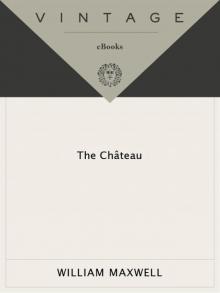 The Chateau
The Chateau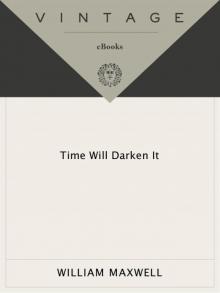 Time Will Darken It Time Will Darken It
Time Will Darken It Time Will Darken It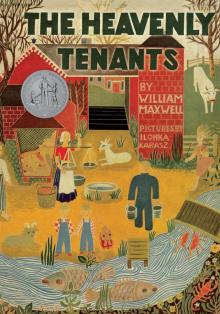 The Heavenly Tenants
The Heavenly Tenants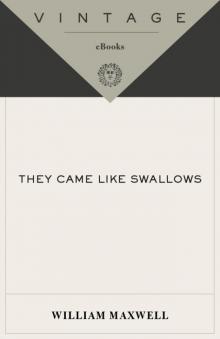 They Came Like Swallows
They Came Like Swallows So Long, See You Tomorrow
So Long, See You Tomorrow The Folded Leaf
The Folded Leaf All the Days and Nights
All the Days and Nights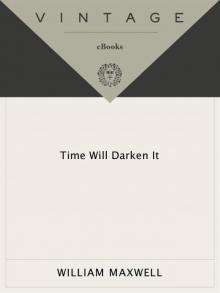 Time Will Darken It
Time Will Darken It Ancestors
Ancestors